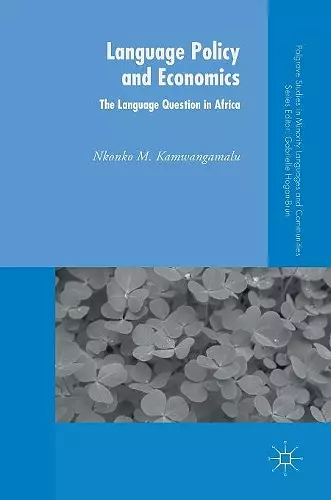Language Policy and Economics: The Language Question in Africa
Format:Hardback
Publisher:Palgrave Macmillan
Published:3rd May '16
Currently unavailable, and unfortunately no date known when it will be back

"Kamwangamalu's book is an addition to literature concerning African languages, demonstrating that they constitute elements in socio-political and economic development. Policy designed to promote languages in higher domains like education must demonstrate that they produce economic advantages for speakers. Previous studies of language planning have discussed responses to planning rather than acceptance or rejection of policy outcomes. Colonial and indigenous languages must participate equally in education, politics and economics. Kamwangamalu shows language economics and game theory contributing to Prestige Planning and development of benefits to citizens' educational, economic and political results. This is a splendid, important book, overdue in literature on African languages." (Robert B. Kaplan, Emeritus Professor, University of Southern California, United States) "This volume is an ambitious undertaking, fruit of meticulous research and deep reflection. Professor Kamwangamalu's panoramic assessment of language planning, economics and game theory in colonial, post-colonial and globalised sub-Saharan African settings brilliantly deploys notions of 'Prestige Planning' to recurring dilemmas about the choices of medium of instruction in schooling and language choices in public and private institutions. This volume is groundbreaking theoretically and methodologically, but remains grounded in the real world needs of diverse African communities in their unique historical experiences of colonialism and their modern trajectories in an increasingly interlinked world. Professor Kamwangamalu's reinvigoration of the framework of 'prestige' in language and how it can be activated adds great practical value to his impressive scholarly achievement." (Joseph Lo Bianco, Professor, University of Melbourne, Australia) "The language issue reminds us all of the latent and recurrent challenges facing Africa in its search for inclusive sustainable development. Any discussion of language policy and planning in this context always raises the daunting question: "what solution do you propose?" To this question, Kamwangamalu's answer is Prestige Planning; that is to say, "African languages must be shown to have tangible economic return for their speakers to be viewed as viable alternatives to colonial languages"." (Paulin G. Djite, Professor, Universite Felix Houphouet Boigny, Cote d'Ivoire)
Breaking with the traditional approach to the continent’s language question by focusing on the often overlooked issue of the link between African languages and economic development, Language Policy and Economics argues that African languages are an integral part of a nation’s socio-political and economic development.This book addresses the perennial question of how to promote Africa’s indigenous languages as medium of instruction in educational systems. Breaking with the traditional approach to the continent’s language question by focusing on the often overlooked issue of the link between African languages and economic development, Language Policy and Economics argues that African languages are an integral part of a nation’s socio-political and economic development. Therefore, the book argues that any language policy designed to promote these languages in such higher domains as the educational system in particular must have economic advantages if the intent is to succeed, and proposes Prestige Planning as the way to address this issue. The proposition is a welcome break away from language policies which pay lip-service to the empowerment of African languages while, by default, strengthening the stranglehold of imported European languages.
“The book provides an in-depth review of historical and current analysis of the language question in Africa and presents a valuable case study combining the tenets of language economics and LPP.” (Weiguo Zhang, Language Problems and Language Planning, Vol. 43 (4), 2019)
“This book provides a fruitful resource for understanding most of the core issues of LPP in sub-Saharan Africa … It makes for an informative read and is written in a style that is also accessible to undergraduate students. … Language Policy and Economics is a monograph written not only by one of the most influential scholars on language policy in sub-Saharan Africa, but also by someone who, at least to some degree, is an African language activist.” (Stephanie Rudwick, Slovo a slovesnost, Vol 79 (2), 2018)
“The book is well-written, comprehensive, and laudable in its unique focus on language policy and economics. It recognises the contributions, challenges, and solutions involved with language questions in Africa. It provides a new approach for language-policy-and-planning studies around the world by balancing former colonial languages and African varieties through the lens of the author’s model. ... The book is key for continuing treatments of the interactions between policy and practice, with specific emphasis on socioeconomic value in the linguistic market.” (Tianwei Zhang, Journal of Mutilingual and Multicultural Development, Vol. 38, 2017)
ISBN: 9780230251724
Dimensions: unknown
Weight: 4401g
232 pages
1st ed. 2016